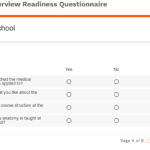Medical MMI Interview Readiness Questionnaire
Stick to the MMI topic – no waffling !
Talking is great but as long as it is on topic and answering the question. MMI questions are designed to be a little open to allow you some room to explore the subject but try not to go off on a tangent. Explain your points in a clear and logical manner so they flow from the highest overall theme down to the detail. Connect this all back up towards the end in the summary. When you feel you’re veering off track finish your point and then reset yourself – but don’t repeat yourself. If you have finished with the questions then let the interviewer ask follow up questions – in fact proactively offer to answer any areas they want expanding. Great opportunity to nudge the interviewer into giving you a hint as to what you need to focus on to get the higher score.
Be structured in your MMI response, addressing each point in turn – use examples!
Don’t be shaken by the MMI interviewer challenging you.
MMIs are actually conversations or discussions about a topic. You need to talk about the issue at hand providing the overarching principle and then relating it to your own personal experience and the context of the scenario / question being presented. Assessors may challenge you and be quite antagonistic about your viewpoint, but that doesn’t necessarily mean you’re wrong – but always make sure you caveat any opinion since there is rarely a black and white conclusion. All because the assessor asks you to explain or reconsider doesn’t mean you’re wrong but it does mean you need to empathise with the other side of the argument and put forward their rationale and the justifications of your view. Always appreciate the points put forward by the examiner. You may even reconsider your own points, but as long as you’re able to explain your reasoning you should be good.
Keep your answers focused on skills required of a doctor
Know what skills are required by a doctor. If you understand what skills are required you will better understand how to structure your responses. Your suitability to be a doctor is being tested here so you need to show that you possess the qualities required. Of course, in an MMI interview its a little hard to show that you’re a good listener but you can definitely provide examples and demonstrate that you are a good communicator, have teamworking ability, leadership skills, empathy etc..). I would write these skills out and read them daily so they become ingrained in your mind !
Use reflection wherever you can
The work experience is a time that you can provide real reflections on your development. How did it change you? What did you learn? What impact did it have? How did you feel? Reflecting well shows you are willing to learn from your experiences – you’ve already done this during your personal statement but here you need to help the assessor appreciate that you learnt and changed.
Use and name the ethical principles!
Ethical questions are almost guaranteed. Always mentioned the ethical principle you are applying; Autonomy, Beneficence, Non-maleficence and Justice and sometimes, Capacity. Of course you can describe these principles but that’s not enough you need to actually use the principle so the assessor knows you know the principles – and will help you stand out and look more organised. Be systematic in your application of the principles explaining each one in context.
Make sure all your arguments are balanced!
Most questions will have a controversial or subjective perspective – whatever you do make sure you assess both sides. Take on each role explaining the pros and cons before coming to a conclusion based on evidence. Never ever jump to a conclusion. You need to demonstrate the ability to understand the other side – a key requirement for a doctor. For every point you make for a particular position make sure you say however and giver the counter argument. You can summarise your own view or come to a decision but make sure you state why and if … happened… then to ensure you cater for other scenarios and that the premise of your position is clear. DO NOT be one-sided or make a blanket statement or take an extreme position.
Difficulties with Medicine!
The medical school wants you to appreciate that medicine is not a perfect career and that hard times are ahead. Acknowledge the difficulties – long hours, low pay, hard work, life long learning, emotional stress, overwork – but offset these with the reason for you wanting to become a doctor and why you feel this is your calling. You can even explore how you would deal with any challenges that you’ve faced and how this relates to medicine.
Read the GMC Guidelines twice!
The Good Medical Council publishes ethical guidelines and is the main source that you should be looking at before your interviews. If something comes up about professionalism etc. don’t be afraid to drop the words “GMC Guidelines” in there. You don’t need to memorise the document, but it definitely will be helpful if you are aware of them so that you can answer in line with best practice.








